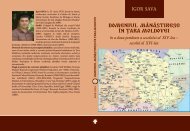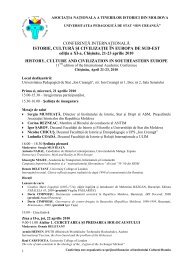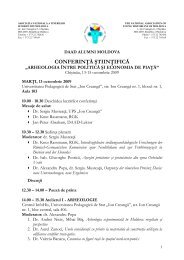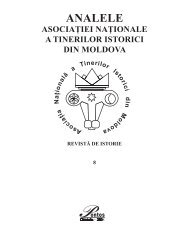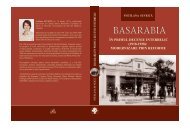LUCIA SAVA, Viaţa cotidiană în oraşul Chişinău la - Asociatia ...
LUCIA SAVA, Viaţa cotidiană în oraşul Chişinău la - Asociatia ...
LUCIA SAVA, Viaţa cotidiană în oraşul Chişinău la - Asociatia ...
Create successful ePaper yourself
Turn your PDF publications into a flip-book with our unique Google optimized e-Paper software.
<strong>Viaţa</strong> <strong>cotidiană</strong> <strong>în</strong> <strong>oraşul</strong> <strong>Chişinău</strong> <strong>la</strong> <strong>în</strong>ceputul secoului al XX-lea (1900-1918)<br />
SUMMARY<br />
INTRODUCTION<br />
205<br />
What is the meaning of „Daily Life”? Making up the p<strong>la</strong>ce above all the<br />
political thinking and the existence thinking,the direct meaning of the term<br />
„daily life” would be something which imperceptibly makes us perceive<br />
everything that models our g<strong>la</strong>nce and hearing without paying attention to<br />
it because it includes everything that happens every day; everything that is<br />
common, usual, of every day.The world where a problem of „daily life” may<br />
show up is the world characterized by an iso<strong>la</strong>ted symbolic organization<br />
governed by a certain number of figures or instances excessing,dominating<br />
and supervising the scene of normal existence.<br />
To emphasize the complexity of daily life content, and also to remove<br />
some confusions regarding modalities of its interpretation from scientific<br />
point of view, we consider it is necessary to highlight some approaches in<br />
terms of daily life from the perspective of social and humanity disciplines<br />
re<strong>la</strong>ted to the history.<br />
The exp<strong>la</strong>nations of „daily life” are of historical, sociological, psychoanalytical,<br />
anthropological, philosophical nature, however each of these human<br />
or social sciences has its own specific difference in the method and finality of<br />
cutting up the world of everyday life, in rational division of the reality as such<br />
and in its interpretation from different points of view.<br />
From sociological point of view, for example, Norbert Elias estimates<br />
that the definition of „daily life” depends <strong>la</strong>rgely on what it is not, that is,<br />
we could learn more about it from what doesn’t exist and from the qualities<br />
that its opposite is getting than from what it should be itself. From this<br />
point of view, „daily life” is a re<strong>la</strong>tive and variable term: its definition always<br />
depends on its correspondent,which could be different each time, in function<br />
of ending up the defining process and the one establishing the c<strong>la</strong>ssifying<br />
criteria. In terms of time to daily life are opposed the days of festivity, holidays<br />
and vacation, in this sense, it appoints our every day activity; whether it<br />
is the opposite of the bourgeois luxury life, then through daily life we understand<br />
the worker’s or peasant’s way of being, who is caught by the routine of<br />
his everyday programme; from political point of view to daily life is opposed<br />
the life of leaders (kings, princes, presidents, ministers, etc.).<br />
Also, the daily life is tantamounted to private life (family, children, intimacy),<br />
which is opposed to public or professional life. The distinction<br />
between public and private space is very complex; for example, the dwelling



